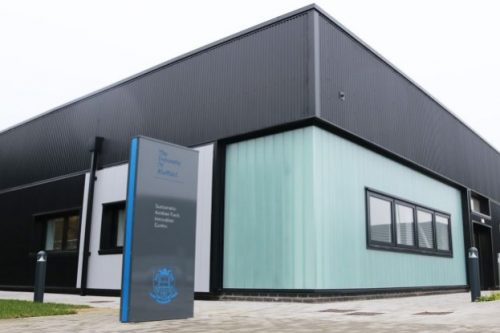University to support world’s first net zero transatlantic flight

The first ever net zero transatlantic flight will take off from the UK next year as part of a project – involving University of Sheffield – to fly across the Atlantic using solely sustainable aviation fuel (SAF).
Virgin Atlantic will receive UK government funding for the landmark flight from London Heathrow to New York’s John F Kennedy Airport in 2023.
The University of Sheffield is part of the British consortium leading the project, which also includes Rolls-Royce, Boeing, Imperial College London, Rocky Mountain Institute (RMI) and ICF.
The university’s Energy Institute will be working with OEMs, the aviation industry and operational partners to ensure the scientific integrity of the data used in the project.
University of Sheffield’s Sustainable Aviation Fuels Innovation Centre (SAF-IC) – the first centre of its kind in the UK and located on the Sheffield and Rotherham border – will undertake the pre-screening of SAF at its SAF characterisation lab.
SAF-IC will test, validate and certify new SAF, providing the UK with testing capabilities to facilitate bringing SAF fuels to the market.
Professor Mohamed Pourkashanian, head of the University of Sheffield Energy Institute, said: “Through this partnership of world-leading aviation experts from industrial and academic backgrounds, we’re going to help make sustainable aviation fuels a reality for long-haul flights.
“The facilities at the University of Sheffield – including the Sustainable Aviation Fuels Innovation Centre – are the first of their kind in the UK and are at the cutting edge of SAF development, characterisation and testing.
“We’re excited to join this project to deliver the fuel which will drive the decarbonisation of the aviation sector, and secure greener, cleaner flights for the future.”
The flight – on one of Virgin Atlantic’s flagship Boeing 787s, powered by Rolls-Royce Trent 1000 engines – is expected to be fuelled by SAF made primarily from waste oils and fats, such as used cooking oil.
The use of SAF on the flight, combined with carbon removal through biochar credits – a material which traps and stores carbon taken from the atmosphere – will make the flight net zero.
Transport Secretary, Mark Harper, said: “For decades, flying from London to New York has symbolised aviation’s ability to connect people and drive international progress.
“It’s now going to be at the forefront of cutting carbon emissions from flying.
“Not only will this flight pave the way for future generations, but it will demonstrate just how much we can achieve when we work together on a shared goal – bringing together some of the best businesses and academics in the world and led by a British airline.”








